人教版高中英语Book 3 Unit 1 Festivals around the world Grammar ---情态动词复习教学课件 (共22张PPT)
文档属性
| 名称 | 人教版高中英语Book 3 Unit 1 Festivals around the world Grammar ---情态动词复习教学课件 (共22张PPT) | 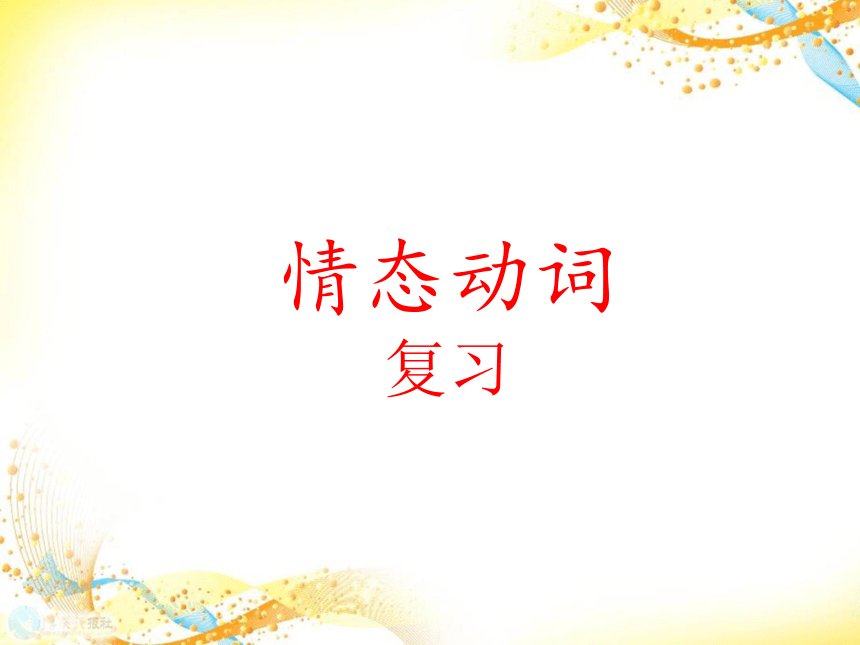 | |
| 格式 | zip | ||
| 文件大小 | 883.5KB | ||
| 资源类型 | 教案 | ||
| 版本资源 | 人教版(新课程标准) | ||
| 科目 | 英语 | ||
| 更新时间 | 2020-02-15 21:11:02 | ||
图片预览

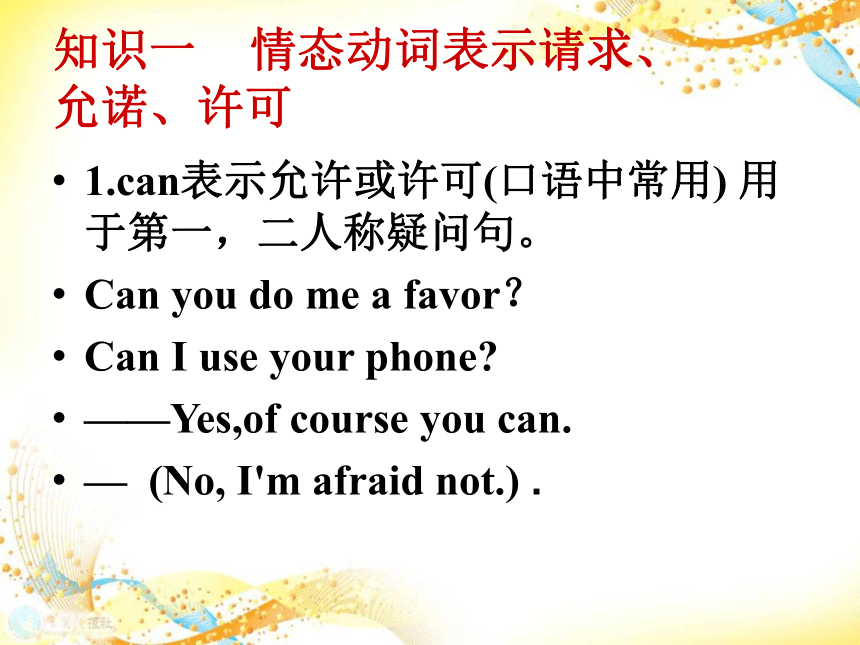
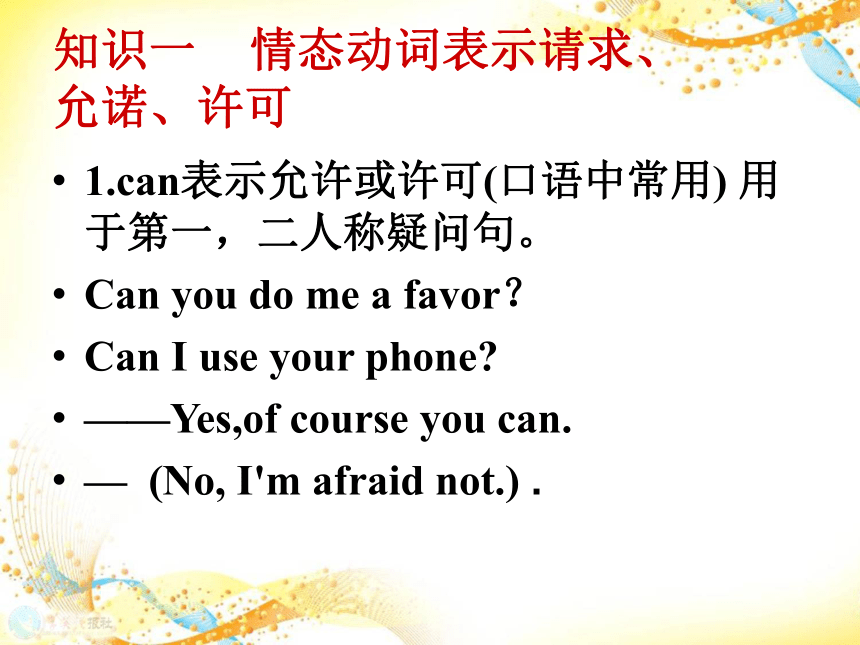
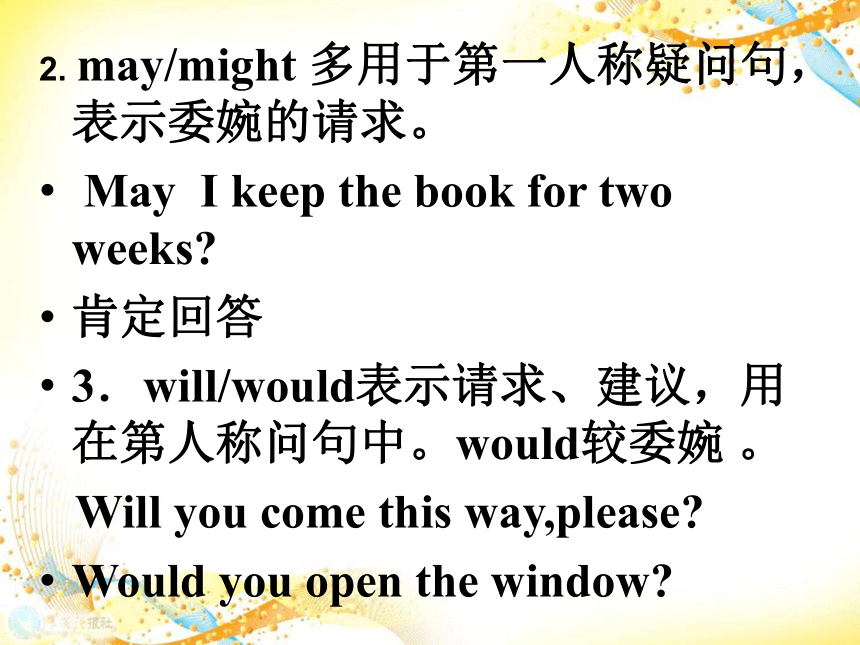
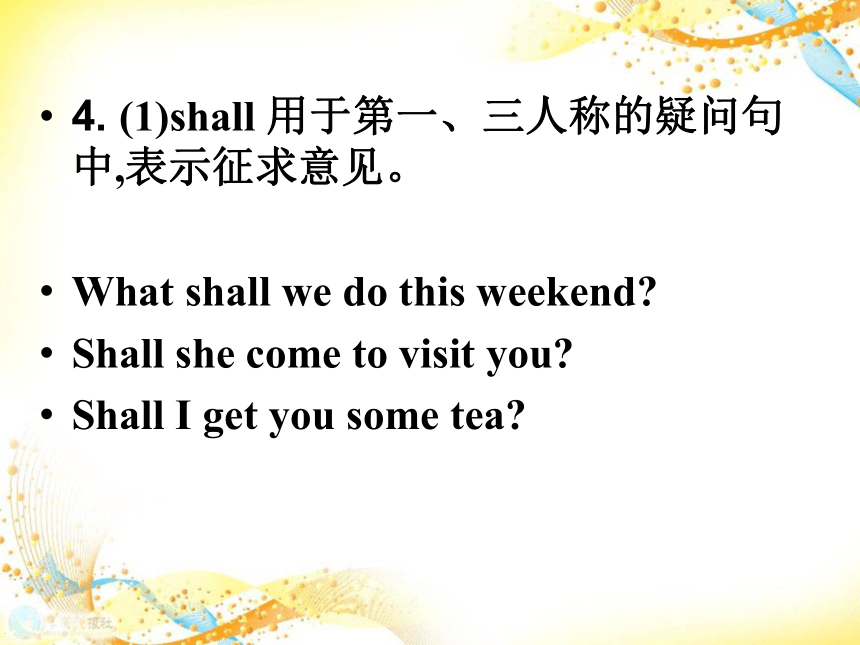
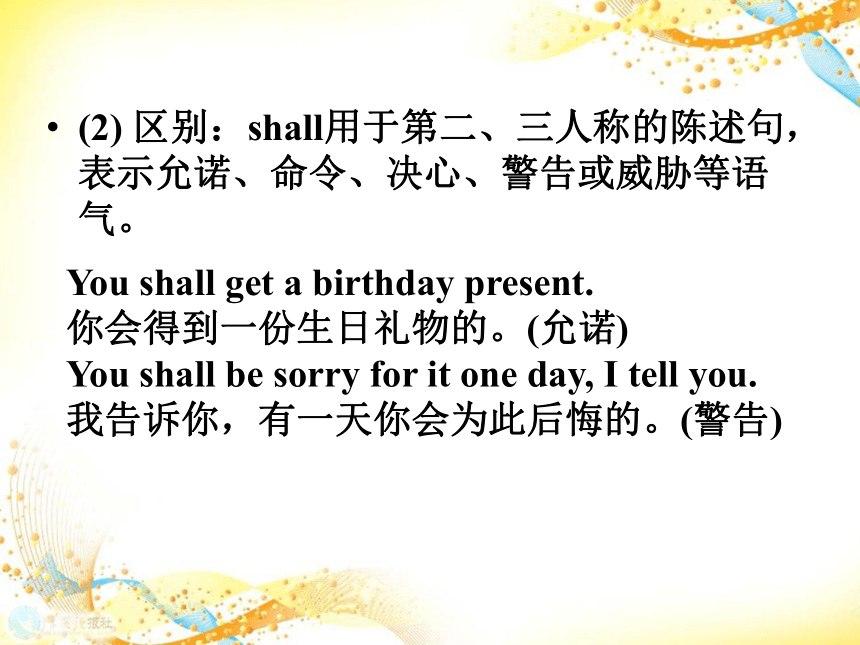


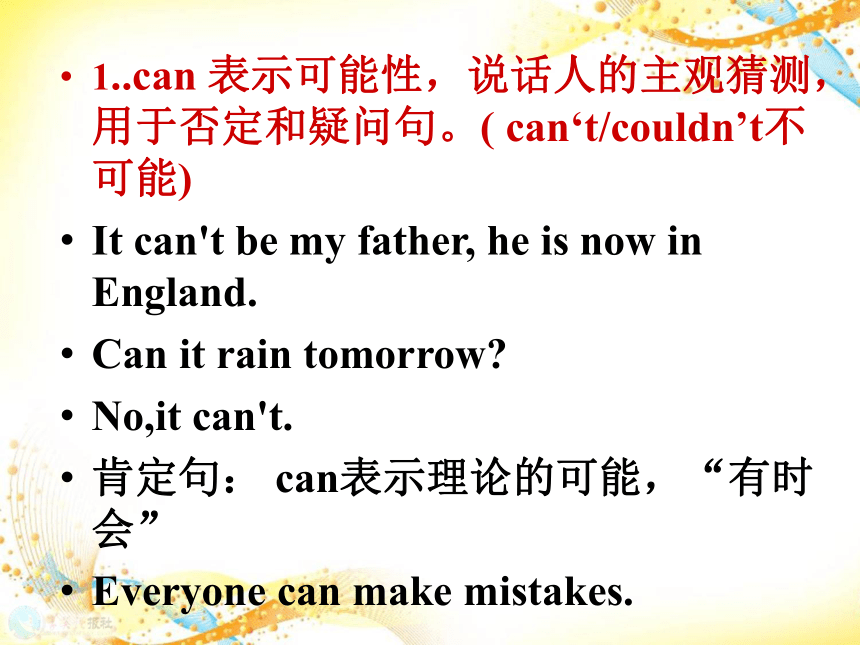
文档简介
(共22张PPT)
情态动词
复习
知识一 情态动词表示请求、
允诺、许可
1.can表示允许或许可(口语中常用) 用于第一,二人称疑问句。
Can you do me a favor?
Can I use your phone?
——Yes,of course you can.
— (No, I'm afraid not.) .
知识一 情态动词表示请求、
允诺、许可
1.can表示允许或许可(口语中常用) 用于第一,二人称疑问句。
Can you do me a favor?
Can I use your phone?
——Yes,of course you can.
— (No, I'm afraid not.) .
2. may/might 多用于第一人称疑问句,表示委婉的请求。
May I keep the book for two weeks?
肯定回答
3.will/would表示请求、建议,用在第人称问句中。would较委婉 。
Will you come this way,please?
Would you open the window?
4. (1)shall 用于第一、三人称的疑问句中,表示征求意见。
What shall we do this weekend?
Shall she come to visit you?
Shall I get you some tea?
(2) 区别:shall用于第二、三人称的陈述句,表示允诺、命令、决心、警告或威胁等语气。
You shall get a birthday present.
你会得到一份生日礼物的。(允诺)
You shall be sorry for it one day, I tell you.
我告诉你,有一天你会为此后悔的。(警告)
1.(2014·北京卷)________ I have a word with you? It won't take long.
2.(2012·辽宁卷)One of our rules is that every student ________ wear school uniform while at school.
知识二 情态动词表推测
1..can 表示可能性,说话人的主观猜测,用于否定和疑问句。( can‘t/couldn’t不可能)
It can't be my father, he is now in England.
Can it rain tomorrow?
No,it can't.
肯定句: can表示理论的可能,“有时会”
Everyone can make mistakes.
2.may/might 表可能,也许,常用于肯定和否定句。 may not/might not(可能不)
He may be very busy now.
Lisa might not come tonight, for it
snowed heavily.
3. should /ought to 表示按照常理所做的有把握的推断。‘按理应该’。
It is 8 now,he should be at work.
This book should be published in two month.
区分:should 也表示责任和义务 ‘应该,应当
We should protect our earth from being polluted.
4.must 表示非常肯定的猜测,在肯定句指“肯定,一定”,反义词是can't(不可能)
She must be in the classroom now.
You must be joking!
You can't have known the truth.
比较:must 还表示按照职责,义务必须做某事,“应该,必须”。反义词mustn't 不准,不许。
Plants must have water to live.
Drivers mustn't drive after drinking.
高考题检测
1. (2015·重庆卷)You ________ be Carol. You haven't changed a bit after all these years.
2..(2014·江西卷)Life is unpredictable; even the poorest ________ become the richest.
3.(2013·新课标全国卷Ⅱ)Since nobody gave him any help, he ________ have done the research on his own.
4.(2013·北京卷)—You ______take an umbrella. It isn't going to rain.
5.(2013·重庆卷)—What are you doing this Saturday?
—I'm not sure, but I ________ go to the Rolling Stones concert.
知识三情态动词+have done
.表示对过去已完成情况的推测
1. Must +have done 对过去已经发生的行为进行推测,意为“想必/准是/一定作了某事”。
He must have gone to Beijing.
他一定已经去北京了。
He must have waited here for a long time.
他一定在这里等了很长时间了。
2.could(不用can)+have done, 表示“本来能够…而没能…”,具有婉转的批评和责备之意。
He could have passed the exam.
You could have told me earlier.
你本该早点告诉我的
3.Can’t /couldn’t have done 不可能做过~
The room can’t have been cleaned by him.
4.might(may)+have done表示“有可能做过某事”
They may have finished their homework.
Mary might have learned some Chinese before.
5.should/ought to+have done,表示“本该做某事而实际上没做”,用于否定句时,则表示“不该做的事反而做了”。
You should have studied harder.
We ought to have given you more help.
我们本应该给你更多的帮助。(但并没有给予更多)
6.needn’t +have done本没必要做某事
She needn’t have gone to the station yesterday.
昨天她本不必到火车站去的.(昨天她去了)
You needn’t have bought it.
你本可不必买它的。 (你买了)
1.(2015·福建卷)—Sorry, Mum! I failed the job interview again.
—Oh, it's too bad. You ________ have made full preparations.
2.(2013·陕西卷)The children ________(get) lost in the woods; otherwise, they would have been at the lakeside camp as scheduled.
3.(2012·江西卷)We ________ have bought so much food now that Suzie won't be with us for dinner.
情态动词
复习
知识一 情态动词表示请求、
允诺、许可
1.can表示允许或许可(口语中常用) 用于第一,二人称疑问句。
Can you do me a favor?
Can I use your phone?
——Yes,of course you can.
— (No, I'm afraid not.) .
知识一 情态动词表示请求、
允诺、许可
1.can表示允许或许可(口语中常用) 用于第一,二人称疑问句。
Can you do me a favor?
Can I use your phone?
——Yes,of course you can.
— (No, I'm afraid not.) .
2. may/might 多用于第一人称疑问句,表示委婉的请求。
May I keep the book for two weeks?
肯定回答
3.will/would表示请求、建议,用在第人称问句中。would较委婉 。
Will you come this way,please?
Would you open the window?
4. (1)shall 用于第一、三人称的疑问句中,表示征求意见。
What shall we do this weekend?
Shall she come to visit you?
Shall I get you some tea?
(2) 区别:shall用于第二、三人称的陈述句,表示允诺、命令、决心、警告或威胁等语气。
You shall get a birthday present.
你会得到一份生日礼物的。(允诺)
You shall be sorry for it one day, I tell you.
我告诉你,有一天你会为此后悔的。(警告)
1.(2014·北京卷)________ I have a word with you? It won't take long.
2.(2012·辽宁卷)One of our rules is that every student ________ wear school uniform while at school.
知识二 情态动词表推测
1..can 表示可能性,说话人的主观猜测,用于否定和疑问句。( can‘t/couldn’t不可能)
It can't be my father, he is now in England.
Can it rain tomorrow?
No,it can't.
肯定句: can表示理论的可能,“有时会”
Everyone can make mistakes.
2.may/might 表可能,也许,常用于肯定和否定句。 may not/might not(可能不)
He may be very busy now.
Lisa might not come tonight, for it
snowed heavily.
3. should /ought to 表示按照常理所做的有把握的推断。‘按理应该’。
It is 8 now,he should be at work.
This book should be published in two month.
区分:should 也表示责任和义务 ‘应该,应当
We should protect our earth from being polluted.
4.must 表示非常肯定的猜测,在肯定句指“肯定,一定”,反义词是can't(不可能)
She must be in the classroom now.
You must be joking!
You can't have known the truth.
比较:must 还表示按照职责,义务必须做某事,“应该,必须”。反义词mustn't 不准,不许。
Plants must have water to live.
Drivers mustn't drive after drinking.
高考题检测
1. (2015·重庆卷)You ________ be Carol. You haven't changed a bit after all these years.
2..(2014·江西卷)Life is unpredictable; even the poorest ________ become the richest.
3.(2013·新课标全国卷Ⅱ)Since nobody gave him any help, he ________ have done the research on his own.
4.(2013·北京卷)—You ______take an umbrella. It isn't going to rain.
5.(2013·重庆卷)—What are you doing this Saturday?
—I'm not sure, but I ________ go to the Rolling Stones concert.
知识三情态动词+have done
.表示对过去已完成情况的推测
1. Must +have done 对过去已经发生的行为进行推测,意为“想必/准是/一定作了某事”。
He must have gone to Beijing.
他一定已经去北京了。
He must have waited here for a long time.
他一定在这里等了很长时间了。
2.could(不用can)+have done, 表示“本来能够…而没能…”,具有婉转的批评和责备之意。
He could have passed the exam.
You could have told me earlier.
你本该早点告诉我的
3.Can’t /couldn’t have done 不可能做过~
The room can’t have been cleaned by him.
4.might(may)+have done表示“有可能做过某事”
They may have finished their homework.
Mary might have learned some Chinese before.
5.should/ought to+have done,表示“本该做某事而实际上没做”,用于否定句时,则表示“不该做的事反而做了”。
You should have studied harder.
We ought to have given you more help.
我们本应该给你更多的帮助。(但并没有给予更多)
6.needn’t +have done本没必要做某事
She needn’t have gone to the station yesterday.
昨天她本不必到火车站去的.(昨天她去了)
You needn’t have bought it.
你本可不必买它的。 (你买了)
1.(2015·福建卷)—Sorry, Mum! I failed the job interview again.
—Oh, it's too bad. You ________ have made full preparations.
2.(2013·陕西卷)The children ________(get) lost in the woods; otherwise, they would have been at the lakeside camp as scheduled.
3.(2012·江西卷)We ________ have bought so much food now that Suzie won't be with us for dinner.
同课章节目录
